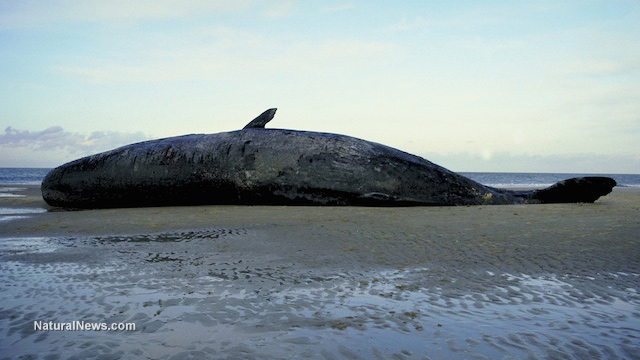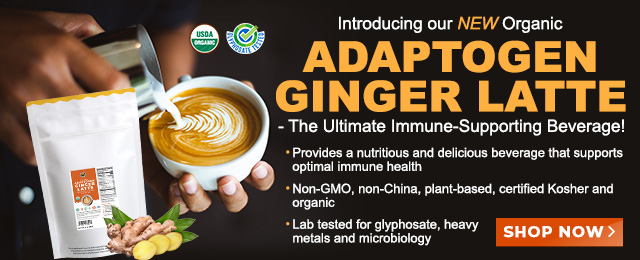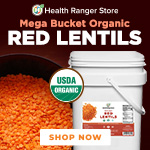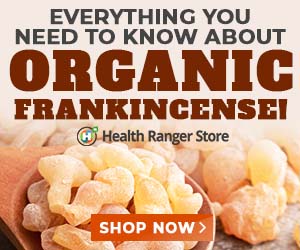Pollution continues to murder whales as their stomachs are found brimming with plastic
Wednesday, August 24, 2016 by: Amy Goodrich
Tags: plastic pollution, whales, animal deaths

(NaturalNews) Since the beginning of this year, nearly thirty sperm whales washed up on the North Sea coast. Of these stranded animals, thirteen were found on a beach near the town of Toenning in Schleswig-Holstein, Germany. An autopsy of these thirteen whales left scientists deeply disturbed.
The animals' stomachs were full of plastic debris, including a 43-foot-long fisherman's net as well as a 28-inch piece from a car and sharp remains of plastic buckets.
Some experts say violent storms in the north-eastern Atlantic pushed the squid into shallower water. The whales followed their staple food and eventually ended up on the German beach.
Starving with full stomachs
Ursula Siebert from the Hanover Veterinary College, however, believes these animals were starving and hadn't eaten anything but plastic in the days before they died.Speaking to the Daily Mail, she said that, in spite of how much rubbish they found inside the intestines of the sperm whales, it was not the official cause of death. It is believed that the animals died of cardiac and circulatory failure. However, one could postulate that starvation certainly contributed to their untimely deaths.
She noted that all the animals were young males, aged between 10 and 15 and weighing between 12 and 18 tons. They didn't appear to have any issues with their internal organs and had a healthy number of parasites.
A 15-ton sperm whale needs about 1,000 pounds of food every day. However, the investigation found no evidence that they had eaten anything other than plastic since they left the Norwegian waters and entered the North Sea.
Rob Deaville, the project manager for the UK Cetacean Strandings Investigation Programme, told The Telegraph that he has never dealt with so many stranded whales around the North Sea coast in 20 years.
"Historically we have had mass strandings but nothing of this scale for decades," he said.
Plastic oriented society
Schleswig-Holstein environment Minister Robert Habeck said these findings show us the outcome of a plastic-oriented society. He further added that animals inevitably eat plastic and other rubbish which make them suffer and die from starvation.Not only the big food-sucking marine life has to cope with how we manage our plastic waste and are destroying the planet. As stated by Nicola Hodgkins of Whale and Dolphin Conservation in the True Activist, large pieces will cause obvious problems and block the gut, but we shouldn't ignore the smaller bits that could cause a more chronic problem for all marine species.
It is said that about 80 percent of plastic waste dumped on land eventually ends up in the oceans where it is either eaten by marine life or floating around in massive garbage patches.
Sadly, this is not the first time animals were killed due to accidental ingestion of human debris. In 2011, a young whale was found dead near the coast of the Greek island of Mykonos. When they dissected its four stomachs, they found nearly 100 plastic bags and other pieces of trash.
A 2015 study published in the journal Proceedings of the National Academy of Sciences of the Unites States of America reported that 90 percent of sea birds accidentally ingest plastic.
Marine pollution is posing a direct and severe threat to the balance of the marine ecosystems. Also, plastic microparticles are invading our food chain and threatening our wellbeing too. Until we get our plastic usage and pollution under control, animals and humans alike will suffer the horrible health effects of plastics, and we too will face starvation.
Sources for this article include:
TrueActivist.com
DailyMail.co.uk
Telegraph.co.uk
PNAS.org
Plastic pollution at FETCH.news
Get independent news alerts on natural cures, food lab tests, cannabis medicine, science, robotics, drones, privacy and more.
Take Action: Support Natural News by linking to this article from your website
Permalink to this article:
Embed article link: (copy HTML code below):
Reprinting this article:
Non-commercial use OK, cite NaturalNews.com with clickable link.
Follow Natural News on Facebook, Twitter, Google Plus, and Pinterest
- Newly released JFK files reveal Pentagon's role in creating Lyme disease and covid in the same lab
- Trump nominates VACCINE ZEALOT Susan Monarez to lead the CDC, sidelining RFK Jr.'s reform efforts
- BEWARE: USDA allows genetically engineered vaccines to infiltrate organic food production
- Obama accused of laundering USAID funds to fuel global protest movements, regime change operations
- HUGE: Putin claims 2020 election fraud in U.S. sparked Ukraine war, calls for peace talks with Trump
- Chris Rufo finally reveals abuse liberals unleashed on his wife and young kids...
- Deep State in disarray: Trump's funding freeze sows chaos, Democrats vow legal battle
- STARDUST, a secretive Israeli-US startup, plans risky solar geoengineering experiment to BLOCK OUT THE SUN
- Trump shows his true colors
- $2B Roundup verdict: A landmark blow to Bayer and a win for health freedom
- Trump's greatest betrayal so far: Accelerating Middle East wars, silencing dissent, and serving Zionist masters
- Outrageous government fraud: $312M in COVID loans went to children as young as 9 months old
- Festive flavors: The sweet history, nutritional profile and health benefits of pecan pie
- Dr. Mike Yeadon releases 15-minute testimony - WATCH - about genocidal intent of COVID “vaccines”
- SWEET SABOTAGE: CIA's secret war on Soviet sugar revealed in JFK files
- “Behind the Green Mask”: Rosa Koire exposes the hidden agenda of UN Agenda 21
- Elon Musk: Aliens could be here on Earth RIGHT NOW
- Govt. agency closed by DOGE looked like a palace inside, with oil paintings fit for a KING...
- Elon Musk: Aliens could be here on Earth RIGHT NOW
- EPA advisor admits the agency is funneling billions to climate groups ahead of Trump’s return to White House
- Trump reverses course on Gaza plan, says “nobody is expelling Palestinians”
- Reclaim your health: How midlife exercise reverses years of inactivity
- A lack of integrity in Academia: Harvard professor found GUILTY of fraudulent research to promote CRT theory
- Space war brewing? Russia threatens to destroy Starlink satellites
- Big Pharma's $8 Billion bribery scheme exposed: how doctors are pushed to prescribe junk science, not heal
- Mike Adams Sermon 66: God will DESTROY ISRAEL for its wickedness
- Rep. Nancy Mace introduces bill to ban biological males from female facilities on federal property
- Survival 101: Effective EMF blocking techniques
- 5 Simple steps to boost your brainpower: How to strengthen executive function in a distracted world
- Historian warns Israel may be entering an “IRREMEDIABLE DECLINE”
- Florida takes a stand: DeSantis proposes permanent ban on mRNA vaccine mandates
- RFK Jr.'s SSRI antidepressant investigation sparks liberal meltdown, exposes Big Pharma's dangerous game
- New York politicians push bill allowing governor to indefinitely detain the unvaccinated on a whim
- Sales of survival bunkers rise following Russia’s use of the Oreshnik hypersonic ballistic missile
- Pilots report mysterious lights 'moving at extreme speeds' across Oregon skies
- Newly released JFK files reveal Pentagon's role in creating Lyme disease and covid in the same lab
- EPA advisor admits the agency is funneling billions to climate groups ahead of Trump’s return to White House
- The Health Ranger releases “Vaccine Zombie” song and music video, using AI-animated zombies for the music video
- The pandemic as a tool for INDOCTRINATION: Understanding “The Indoctrinated Brain” by Dr. Michael Nehls
- California's social media censorship law struck down: A victory for free speech or a threat to online safety?
- Dr. Mike Yeadon releases 15-minute testimony - WATCH - about genocidal intent of COVID “vaccines”
- Congratulations to the FULLY UNVACCINATED as you resisted the COVID-19 PROPAGANDA MACHINE fueled by over $100 BILLION
- Mike Adams releases country western hit single: Goin’ Back in Time is Comin’ Home
- RFK Jr. clears key hurdle: Sen. Susan Collins backs controversial HHS nominee, signaling a new era for health policy
- Mike Adams releases music poetry sensation: A Child of God
- Mike Adams releases new song and music video: Nothing More Disgusting Than a Globalist
- Unpacking the Lies That We’ve Been Fed – new song and music video released by Mike Adams, the Health Ranger
- Trump administration takes on global censorship: A new frontier for free speech advocacy
- Florida takes a stand: DeSantis proposes permanent ban on mRNA vaccine mandates
- “Why we influenced the 2020 elections”: Facebook files reveal the coordinated effort to bury the Hunter Biden laptop story
- Ex-FBI Chief EXPOSES disgraceful government coverups of Oklahoma City Bombing, Kennedy assassinations, 9/11 WTC, and "Terrorism" as plot to destroy Constitution
- Michigan sheriff announces criminal investigation into 2020 election crimes, Dominion Voting Systems
- Israeli soldiers accused of even more torture and abuse in the West Bank
- Federal judge backs Trump's mass firings, clearing path for government downsizing
- Red Cross issues warning to stop blood plasma donations from vaccinated people
- Scientists confirm: GENIUS brain function can be spontaneously unleashed in humans without any apparent cause
- EPA advisor admits the agency is funneling billions to climate groups ahead of Trump’s return to White House
- HYSSOP: What research reveals about the health benefits of this ancient holy herb
- Two containers with completed ballots fall out of truck in Florida
- Fully vaccinated about to see “tsunami” of illness and death, warns virologist
- Today I asked our AI language model “Neo” about which phytonutrients or phytochemicals can block the spike protein related to SARS-CoV-2 … Here is what it answered…
- Global leaders unite to clamp down on “misinformation” with UN-backed Cascais Declaration
- BREAKING: 2025 NDAA authorizes mandatory military draft of WOMEN across America… as Pentagon pursues global NUCLEAR war with both Russia and China at the same time
- Michael Yon warns of a ZIONIST TAKEOVER in Trump’s second administration
- BOMBSHELL: DNA testing kits are a SCAM to develop ethnic-specific bioweapons
- Ozempic and Wegovy weight loss drugs are injectable LIZARD VENOM PEPTIDES that may unleash a devastating wave of organ failure… side effects align with symptoms of SNAKE BITES
- Israeli soldiers accused of even more torture and abuse in the West Bank
- These 13 countries just signed an agreement to engineer a global FAMINE by destroying food supply
- NASA admits that climate change occurs because of changes in Earth’s solar orbit, and NOT because of SUVs and fossil fuels
- RFK Jr. clears key hurdle: Sen. Susan Collins backs controversial HHS nominee, signaling a new era for health policy
- Sermon 30: How Jesus reveals Caesar’s FAKE CURRENCY and FALSE AUTHORITY
- Coriander seeds: Ancient medicine backed by modern science
Science News & Studies
Medicine News and Information
Food News & Studies
Health News & Studies
Herbs News & Information
Pollution News & Studies
Cancer News & Studies
Climate News & Studies
Survival News & Information
Gear News & Information
News covering technology, stocks, hackers, and more



"Big Tech and mainstream media are constantly trying to silence the independent voices that dare to bring you the truth about toxic food ingredients, dangerous medications and the failed, fraudulent science of the profit-driven medical establishment.
Email is one of the best ways to make sure you stay informed, without the censorship of the tech giants (Google, Apple, Facebook, Twitter, YouTube, etc.). Stay informed and you'll even likely learn information that may help save your own life."
–The Health Ranger, Mike Adams












































